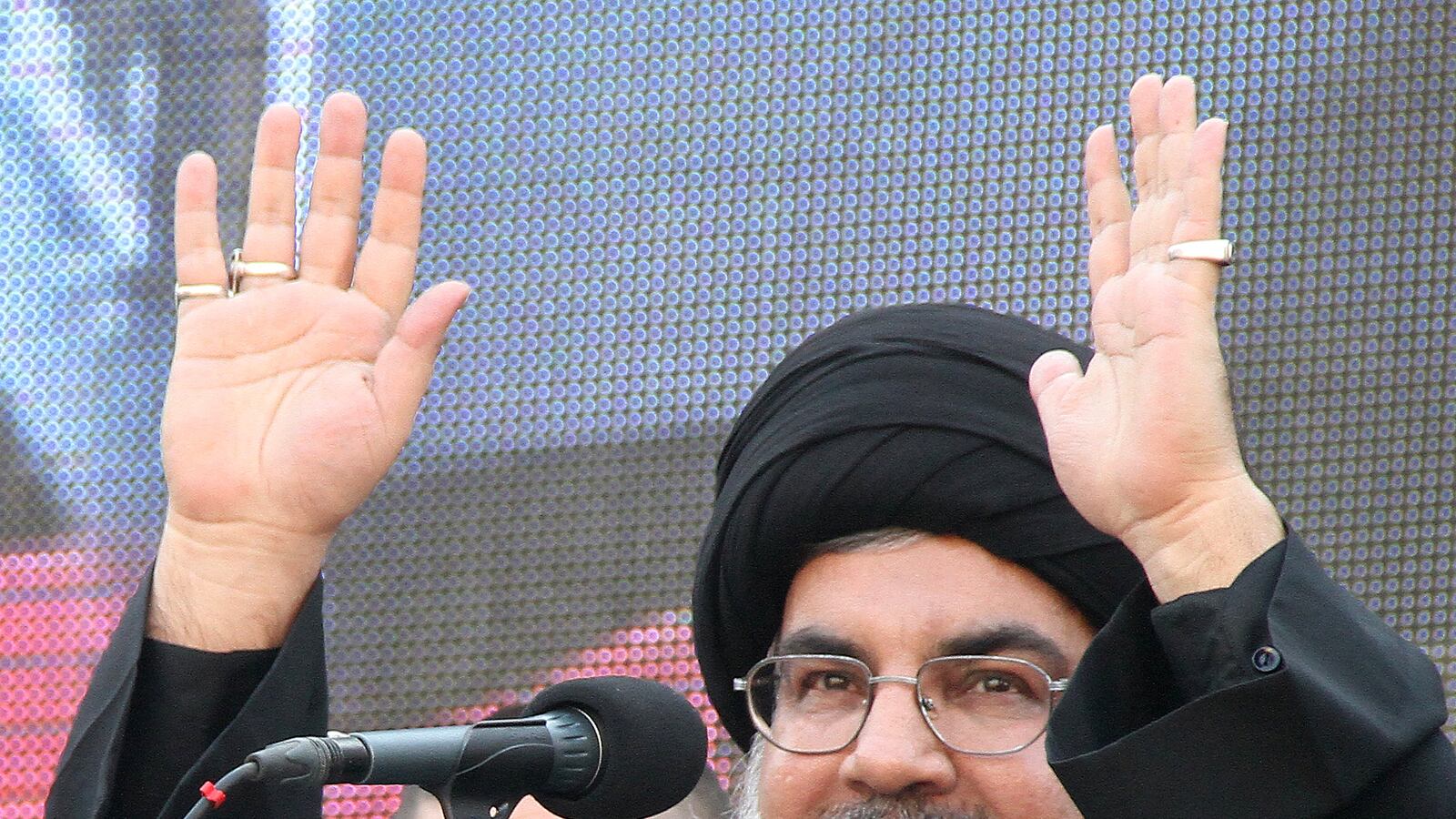Hezbollah Secretary-General Sayyed Hassan Nasrallah, who has made two public speeches over the past two days, was recently the object of some poorly-received mockery. Last week, the Lebanese sketch comedy show “Basmat Watan” took to the airwaves with an episode featuring an impersonation of the black-turbaned cleric. The public reaction—demonstrations in Baalbek, tire burnings in Sin el-Fil, a blocked highway in Tripoli—might have scared more faint-hearted artists into a retraction or an apology, but the show's director, Charbel Khalil, has thus far been defiant.
It's not particularly rare for blasphemy, heresy, impiety, or simple disrespect to spark violence in some corners of the world: witness the way Muslim communities were roiled by the 2006 Jyllands-Posten cartoon controversy. But there's more to public touchiness over last week's sketch than just pious indignation. Hassan Nasrallah is a political figure as much as he is a religious one, and his influence is attested in the way that his constituents have so aggressively risen to his defense.

One of the many reasons Lebanese admirers of Hezbollah's Secretary-General offer for their support is the claim that Nasrallah is, unlike the region's other outsized personalities, a man of his word. I have heard him compared in this respect to Benjamin Netanyahu and Saad Hariri, to Ariel Sharon and Bashar Assad and Michel Aoun, all in the same breath. Nasrallah's supporters view him as the rare political figure who keeps his promises—a view bolstered by Hezbollah's 2006 rout of the IDF. Israeli military planners, it seems, have since also learned not to doubt the powerful cleric's guarantee.
This is one reason why it's worrying, a week after Nasrallah's political entrenchment was underscored by nationwide riots, to hear him making grand prognostications about the future of the region. Nasrallah usually speaks through a television link, hidden away for fear of assassination by Israeli forces, but this week he made two public speeches at a celebration for the Muslim festival of Ashura. In the first, he projected that the failure of nuclear negotiations between Iran and the West would mean wider regional war; in the second, he pledged to keep Hezbollah fighters in Syria for as long as President Bashar al-Assad needs their support.
Former Lebanese Prime Minister Saad Hariri condemned Nasrallah for his Ashura remarks, accusing him in a statement of “[sacrificing] Lebanon's sovereignty and its national unity for the sake of Bashar Assad's regime.” Hariri's political party, the Future Movement, has refused to participate in any future government until Hezbollah ends its involvement in Syria's civil war. It might be tempting to view this war of words between as a kind of standoff, but the facts on the ground prove otherwise. We can safely take Nasrallah at his word when he promises continued assistance to Assad's army; Hezbollah, with its legions of supporters, with its guns and its powerful allies, holds the cards.
Saad Hariri's father, former Prime Minister Rafiq Hariri, was killed by a car bomb in 2005, likely assassinated for resisting Assad's influence in Lebanon. That Hariri fils is still alive, despite his continued impertinence toward the Party of God, is less a testament to his power than to his irrelevance. The eight years since Rafiq Hariri was killed in Beirut have seen Hezbollah's rise to near-unrivaled predominance, a status neatly demonstrated by the events of the past two weeks.
As for Nasrallah's Iran remarks, it'sdifficult to tell whether they were meant as a threat, a promise or aprediction. What they are, transparently and undeniably, is aperformance: as Benjamin Netanyahu preens about Washington, openlysubverting the negotiations, Hezbollah's Secretary-General is doinghis part as well. Both America's and Iran's regional clients are nowopenly attempting to stymie the process of rapprochement. This is inthe rational self-interest of both: American aid to Israel comes inproportion with the extent of American-Iranian tensions, and Iranianaid to Hezbollah arrives in the hopes it will pester and harassIsrael. The reduced friction between America and Iran that wouldfollow a successful negotiation would be a blow to Israel's militarymachine—and to Hezbollah's.






